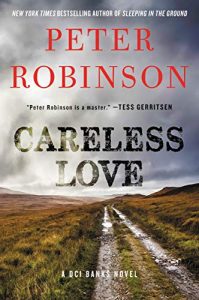This title is available Feb. 12. You can pre-order and we’ll ship when it arrives.
 Peter Robinson’s Inspector Banks books are classics of the rare sort – British police procedurals that aren’t too dark, with a sympathetic main character at the center of things. Banks is a decent guy, obsessed with music and wine (reading the books is a crash course in jazz) and respectful of his co-workers. That said, I was thinking recently about what makes a book great, rather than just good. And I think it’s theme.
Peter Robinson’s Inspector Banks books are classics of the rare sort – British police procedurals that aren’t too dark, with a sympathetic main character at the center of things. Banks is a decent guy, obsessed with music and wine (reading the books is a crash course in jazz) and respectful of his co-workers. That said, I was thinking recently about what makes a book great, rather than just good. And I think it’s theme.
Good books are well structured, have interesting characters and settings, and are possessed of a good story. Those are essential. But going beyond this and adding a theme or central concept takes a book to another level, and it’s what makes novels by writers like Louise Penny, Peter Lovesey, Deborah Crombie and others so prized. You’re tuning in for a mental workout as well as a visit with a favorite character.
Like many British writers, Robinson’s books are a slow burn, but when all the pieces begin to fit, it’s impossible to look away. The book begins with a car crash, and the later discovery of a body in the abandoned car. The young woman found in the car is dressed for an evening out and appears to be a drug overdose or suicide, but there’s no indication of how she may have gotten to the car.
Around the same time, the body of a well-dressed older man is found by hikers in a remote area, neck broken, down at the bottom of a ravine. Again, there’s no indication of how a well-dressed man – not dressed for hiking or even for the cold – may have gotten to where he was found. Can the two cases be connected? This is a mystery novel, so that’s really not in question, but the true suspense of the novel is how and why they are connected and the meticulous police work that uncovers how they came to be where they ended up.
In another area, a colleague of Banks is working on a case of another dead young woman found in a remote shack on the moors, head bashed in. In this case, there’s no question it was murder, and the Inspector in charge is certain there are similarities, He gives Banks a call, and the two departments begin to work together to try and uncover what happened and how the now three victims are connected.
One of Robinson’s strengths is his meticulous and careful description of the smart police work that goes into solving a case. Another is his meditative quality. As Banks frequently meditates on his life path – often while sitting on his sun porch, drinking wine and listening to his carefully curated music collection – the same question applies to the victims. How did they arrive at their final destinations? What choices – or acts of carelessness, as the title implies – take them to where they have ended up?
Robinson’s examination and answer to those questions are what make him a master at what he does. If you’re a fan of smart writing, careful plotting, and a wonderful main character, Inspector Banks and Peter Robinson are here to show you the way.